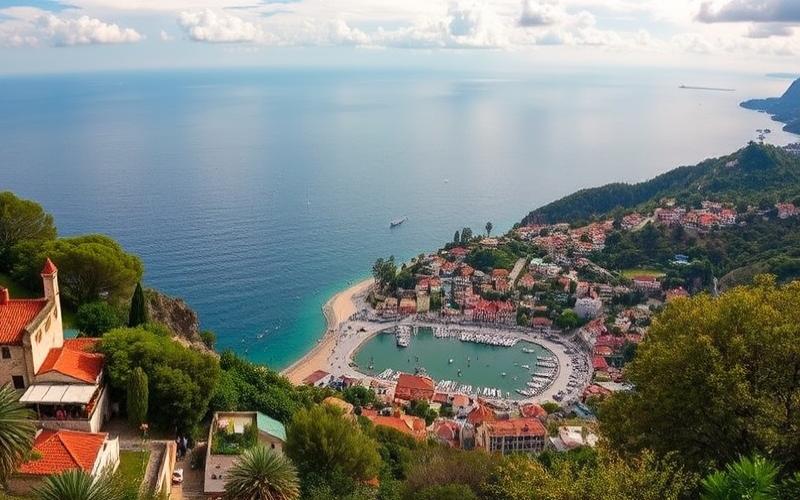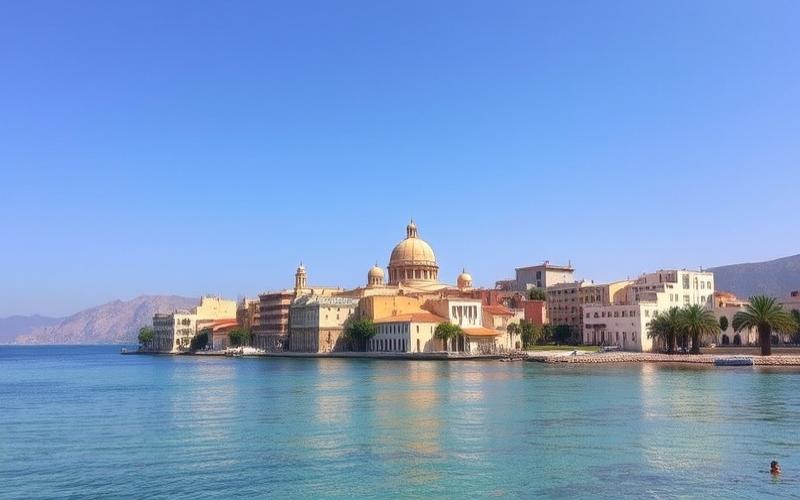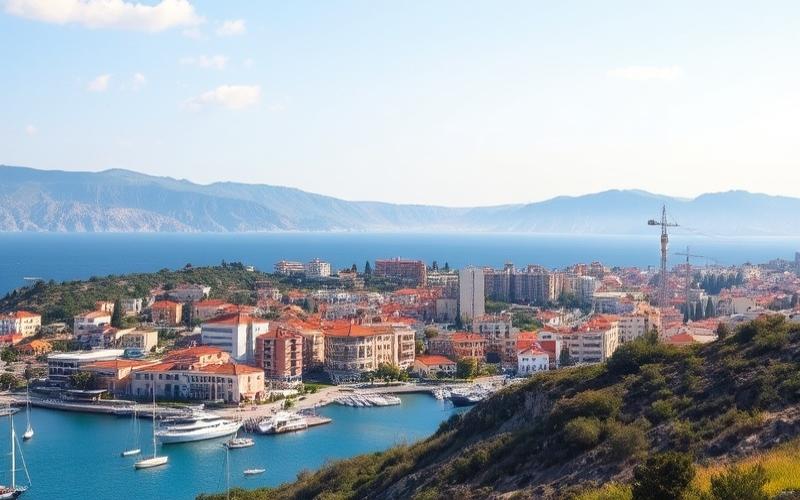
 Published on and written by Cyril Jarnias
Published on and written by Cyril Jarnias
Since the pandemic began, Cyprus’ real estate market has undergone a drastic transformation, revealing new trends among buyers. The health crisis has reshaped priorities, prompting many investors to reconsider their concept of an ideal home. Villas with gardens and spacious apartments have gained preference over small urban residences, while demand for properties offering outdoor space and connection to nature has significantly intensified.
As Cyprus transforms into a preferred destination for those seeking a more serene living environment, evolving preferences highlight the growing importance of remote work and personal well-being, factors that are redefining real estate dynamics on the island.
Impact of the Pandemic on Cyprus’ Real Estate Market
The COVID-19 pandemic caused a sharp contraction in Cyprus’ real estate market in 2020, with sales dropping by approximately 23% across the entire territory. Tourist regions such as Paphos and Limassol were particularly affected, recording decreases of 41% and 29% in transaction volume respectively. This decline is explained by global economic uncertainty, restrictions on international travel, and a temporary slowdown in foreign investment.
However, with the gradual lifting of health restrictions and thanks to the resilience of the local tourism sector, the market quickly rebounded. Between January and August 2023, nearly 11,655 real estate transactions were recorded with a cumulative value close to €2.8 billion. During this period, sales to international buyers increased by 31%, accounting for up to 46% of total registrations – demonstrating a massive return of foreign investors.
| Year | Overall Sales Change | Limassol Change | Paphos Change |
| 2020 | -23% | -29% | -41% |
| Jan-Aug ’23 (vs Previous Year) | +31% (international) | n/a | n/a |
Prices also show a marked upward trend since the post-pandemic recovery:
- In Limassol: the average price per square meter for a seaside apartment surged by +25% between 2023 and early 2025 (reaching approximately €4,500).
- In Paphos: more moderate increase (+15%) but still significant for properties with prime or panoramic locations (€2,500–€3,500/m² depending on amenities).
This surge is driven by several factors:
- Land scarcity in coastal areas
- Improved quality of new constructions
- Sustained demand from foreign investors seeking secondary residences or rental investments
Regarding supply and demand:
- Supply has tightened in attractive sectors (seafront/historic centers), while some peripheral urban segments remain more accessible.
- Foreign demand now exceeds local demand in some major cities.
- New profiles are emerging thanks to the sustained growth of remote work: young digital nomad professionals are seeking modern apartments with outdoor spaces or villas suited to a hybrid work/life style.
Evolving preferences manifest as follows:
- Preference for new/modern apartments with private outdoor spaces (terraces/gardens)
- Growing interest in single-family homes/villas offering private pools or sea views
- Prime locations: proximity to beaches/tourism in Limassol/Larnaca/Paphos; accessibility to high-speed digital infrastructure
- Increased importance placed on energy efficiency/sustainable construction
Among government measures that have influenced the recent market are:
- Gradual increase since early 2025 of VAT on new property purchases raised to 19%, which may weigh on some first-time buyer segments while encouraging quick investment before fiscal tightening.
- Targeted initiatives to attract foreign investors despite volatile international context: simplification of administrative procedures/residence permit issuance for major property purchases.
“The Cypriot real estate market demonstrates considerable durability despite growing pressures… The appetite for properties among local and international buyers has remained largely robust,” emphasizes George Foukarides (Delfi Properties).
In summary:
- Initial sharp decline followed by rapid rebound stimulated by return of tourism/foreign investors
- Widespread but differentiated increases depending on location/amenities (+25% Limassol seafront)
- Shift in supply/demand favoring premium/tourist markets
- Emergence of new needs related to remote work/international mobility
- Adjusted fiscal measures likely to influence future dynamics
Good to Know:
The COVID-19 pandemic significantly impacted Cyprus’ real estate market, leading to a shift in buyer preferences toward more spacious properties on city outskirts. According to a KPMG study, property prices overall decreased by 4.8% in 2020, although some regions, like Limassol, saw increased demand for villas with gardens. Total sales fluctuated, with an initial decline followed by partial recovery thanks to government initiatives like reduced transfer taxes. New buyers now prioritize residences offering remote work spaces, a trend amplified by tax incentives for renovating or purchasing energy-efficient homes. Support for the real estate sector through stimulus policies also helped stabilize the market, although economic uncertainties continue to influence purchasing dynamics.
New Home Purchase Criteria in Cyprus
The evolution of real estate purchase criteria in Cyprus since the COVID-19 pandemic reflects a notable shift in buyer expectations and priorities, whether local or international.
New Preferences Observed:
- Increased Importance of Outdoor Spaces: Buyers now primarily seek properties with private gardens, large terraces, or at minimum spacious balconies. This trend is explained by the need for access to a private outdoor environment after successive lockdowns.
- Spaces Adapted for Remote Work: Demand for homes offering a dedicated room or sufficient space to set up an office has intensified considerably. Houses with multiple bedrooms or flexible layouts are particularly sought after.
- Search for More Rural or Suburban Locations: Attraction to rural, semi-rural, and suburban areas has increased at the expense of dense urban cores. Buyers wish to benefit from a calmer environment, less exposed to crowds and often better suited to post-pandemic family life.
| Criterion | Before COVID-19 | After COVID-19 |
|---|---|---|
| Outdoor Spaces (gardens/balconies) | Low priority | Highly sought after |
| Space for Remote Work | Rarely required | Essential |
| Rural/Suburban Location | Less demanded | Sharply increasing |
Cyprus Real Estate Market Trends in 2025:
- The median price for an apartment reaches €508,000, approximately €4,000/m².
- For a house/villa, the median price is now close to €500,000.
“Families now prefer single-family homes with gardens rather than downtown apartments; many also request an additional room that can serve as an office.”
Real estate agents observe that:
Summary of Professional and Industry Expert Feedback:
- Significant increase in interest for properties outside urban centers.
- Growing demand for interior flexibility (multifunctional rooms).
- Maintained high transaction volume in the new residential segment meeting these new criteria.
Good to Know:
The new home purchase criteria in Cyprus, influenced by the COVID-19 pandemic, reveal a clear preference for properties with outdoor spaces, such as gardens or balconies, and homes adapted for remote work, equipped with extra rooms for offices. Demand is now oriented toward more rural locations, away from dense urban areas, reflecting a desire for tranquility and nature. According to local experts, searches for homes with these characteristics increased by 30% over the past year. Additionally, real estate agents report that properties located in less central but well-connected internet areas are experiencing growing popularity.
Key Takeaway:
The post-pandemic era has profoundly redefined the real estate purchase act in Cyprus—generous outdoor spaces, adaptation to remote work, and relative distance from urban bustle are among the essentials sought by the majority of current buyers.
The Rise of Remote Work and Its Effects on Real Estate Preferences
The rise of remote work, accelerated by the COVID-19 pandemic, has deeply transformed real estate preferences among buyers in Cyprus. Even though remote work practice wasn’t as widespread as elsewhere before the pandemic, it has gradually established itself as a new norm for many professionals.
Main Changes in Real Estate Search Criteria:
- Increased search for spaces allowing installation of a home office or additional room dedicated to work.
- Marked preference for houses with gardens, terraces, or other private outdoor spaces enabling isolation and relaxation during or after work.
- Growing attractiveness of suburban and rural areas offering more living space and a better quality of life than densely populated urban centers.
| Real Estate Criterion | Evolution Observed Since Pandemic |
|---|---|
| Home Office | Sharp increase in demand |
| Garden / Terrace / Balcony | Clearly rising demand |
| Homes in Periphery | Strongly progressing popularity |
| Compact Urban Apartments | Relative disinterest |
Testimonials gathered from local agencies and developers reveal that flexible interior space has become a key selling point during visits. Families now prioritize properties offering a versatile room, while young professionals systematically seek a bright office corner.
Higher demand is also observed for:
- Homes with good internet connection (fiber optic).
- Quiet neighborhoods promoting concentration and well-being.
- Properties with open views or proximity to green spaces.
These new requirements have several consequences on the Cypriot market:
“Since 2020, we’ve observed migration outward from major cities. Sales in some coastal villages have increased by up to 20%. Homes with outdoor space sell much faster than before.”
— Local Real Estate Agency
Finally, even though remote work wasn’t very widespread initially in Cyprus, its recent growth is durably transforming the local residential market: it places greater value on daily comfort while redesigning the island’s residential geography.
Good to Know:
The rise of remote work, accelerated by the COVID-19 pandemic, has modified real estate preferences of buyers in Cyprus, with growing demand for residences offering dedicated workspaces. Peripheral areas, often quieter and with larger land plots, have become particularly attractive, increasing the value of properties away from urban centers. Buyers now seek homes with gardens or large terraces to improve their at-home quality of life, a trend supported by a report from the Cyprus Statistical Institute revealing a 25% increase in searches for countryside homes. Testimonials from Cypriot families confirm this transition, highlighting the comfort and flexibility offered by these new configurations, thus transforming the local real estate landscape and reinforcing the importance of adapting living spaces to emerging remote work needs.
Forecasts for Cyprus’ Post-COVID Real Estate Market
Since the pandemic, Cyprus’ real estate market has experienced strong momentum, marked by an unprecedented sales boom and renewed interest from both local and international investors.
Main Recent Trends and Statistics:
- Real estate sales increased by 19% in March 2025 compared to the previous year.
- Purchases by foreigners, particularly non-EU, surged by 25% year-over-year, now representing 30% of transactions in Q1 2025.
- The sector generated approximately €3.1 billion in construction contracts by end of 2024.
- Investment in construction strongly contributes to Cyprus’ real GDP growth (estimated at +3.7% for 2025).
| Segment | Recent Evolution | Outlook |
|---|---|---|
| Apartments | Significant increase | Favorable |
| Houses/villas | Sustained demand | Stable |
| Offices/commercial | Little change | Uncertain/to monitor |
| Secondary/vacation homes | Strong foreign demand | Positive |
Lasting Influence of New Post-COVID Preferences:
- Preference for larger and outdoor spaces has intensified since the pandemic.
- The rise of remote work encourages purchase or rental of residences with dedicated offices or located in pleasant settings outside traditional urban centers.
Determining Factors for Forecasts:
Economic Factors
- Robust economic growth
- Controlled inflation and downward trend in interest rates
Government Policies
- Golden Visa program stimulating foreign investment
- Legal reforms promoting transparency and attractiveness
International Influences
- Influx of non-European buyers seeking legal security and advantageous taxation
- Perceived political stability as major asset amid regional tensions
Promising Segments vs. Weakened Segments:
Segments likely to thrive:
- New residential real estate (apartments/villas)
- Properties intended for expatriates or international buyers
- Alternative investments like urban parking
Segments under pressure:
- Traditional commercial premises (offices/retail), facing remote work development
- Standardized hospitality facing growing demand for premium short-term rentals or hybrid residences
Lasting Impact of Remote Work:
Massive adoption of remote work increases attraction for:
- Spacious homes adapted to home office
- Peripheral locations offering superior quality of life without daily commute constraints
Key Takeaway
The post-COVID Cypriot market remains oriented toward stable but selective growth. High-end residential segments as well as properties suited to flexible lifestyles will likely continue their progression. Short/mid-term, maintaining pro-investor policies and continuous adaptation to new expectations should support this momentum through 2030.
Good to Know:
Since the pandemic, Cyprus’ real estate market has seen increased demand for secondary residences and properties with outdoor spaces, while remote work has stimulated interest for more spacious homes outside urban centers. Recent statistics show a 5% increase in residential property sales in 2023, indicating post-COVID recovery. Prices, meanwhile, experienced moderate growth, attracting foreign investors, particularly from EU countries. Vacation properties and high-end residences are expected to thrive thanks to economic stability and government incentives, while the commercial sector, especially traditional offices, may stagnate due to evolving work practices. Cyprus’ favorable fiscal policies and international trends, like long-term remote work, reinforce optimistic market prospects in the medium term, especially attracting buyers seeking improved quality of life.
Disclaimer: The information provided on this website is for informational purposes only and does not constitute financial, legal, or professional advice. We encourage you to consult qualified experts before making any investment, real estate, or expatriation decisions. Although we strive to maintain up-to-date and accurate information, we do not guarantee the completeness, accuracy, or timeliness of the proposed content. As investment and expatriation involve risks, we disclaim any liability for potential losses or damages arising from the use of this site. Your use of this site confirms your acceptance of these terms and your understanding of the associated risks.

















































